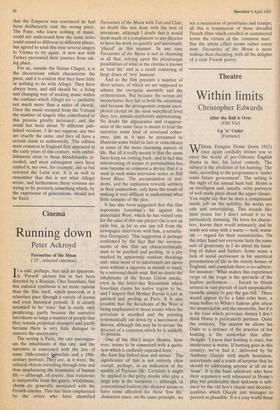Cinema
Running down
Peter Ackroyd
Favourites of the Moon ('15', selected cinemas) Tt is odd, perhaps, that such an apparent- ly 'French' picture has in fact been directed by a Russian, Otar losseliani, but this cultural symbiosis is no more curious than the film itself, which proceeds at a relentless pace through a variety of scenes and even historical periods. It is clearly intended to be 'zany' but is really only perplexing, partly because the narrative introduces so large a number of people that they remain perpetual strangers and partly because there is very little dialogue to remove the uncertainty.
The setting is Paris, the cast encompas- ses the inhabitants of that city, and the narrative is concerned with the fate of some 18th-century Vrcelain and a 19th- century portrait. They are, as it were, the cultural objects travelling through time and thus emphasising the transience of human life — although, of course, that transience is inseparable from the gaiety, wistfulness, charm etc generally associated with the French cinema. This has been emphasised by the critics who have identified Favourites of the Moon with Tati and Clair; no doubt this was done with the best of intentions, although I doubt that it would seem much of a compliment to any director to have his work so quickly and universally 'placed' in this manner. In any case Favourites of the Moon is not as charming as all that, relying upon the picturesque possibilities of what in the cinema is known as 'real life' and as a result consisting of large doses of 'wry' humour.
And so the film presents a number of short scenes, of which we are supposed to admire the energetic assembly and the orchestration. But because the scenes are inconclusive they fail to hold the attention; and because the protagonists remain unex- plored except on the most superficial level they, too, remain stubbornly uninteresting.
No doubt the appearance and reappear- ance of the same faces is meant to lend the narrative some kind of structural coher- ence, just as it may be presumed to illustrate some belief in fate or coincidence as some of the more charming aspects of life. But all it really means is that the same faces keep on coming back, and in fact this interweaving of scenes or personalities has
now become so common a device that it is used in such mass television series as Hill Street Blues. The accumulation of inci- dents, and the aspiration towards subtlety in their connection, only have the result of making it very difficult to understand what little remains of the plot.
It has also been suggested that this film represents Iosseliani's hit against the materialist West, which he has visited only for the sake of this one project (he is not an exile but, as far as one can tell from the newspaper interviews with him, a rebarba- tive Georgian). This suggestion is perhaps confirmed by the fact that the environ- ments of this film are characteristically seen to be patched and peeling, in a city marked by apparently random shootings and, since most of its inhabitants are never seen without a cigarette in mouth or hand, by a universal death wish. But no doubt the inhabitants of the Soviet Union smoke, even in the latter-day Byzantium which Iosseliani claims his native region to be, and I suspect that Mother Russia is just as patched and peeling as Paris. It is also possible that the decadence of the West is being emphasised in those scenes when the porcelain is smashed and the painting systematically cut down by a succession of thieves, although this may be to accuse the director of a crassness which he is unlikely to possess.
One of the film's major themes, how- ever, seems to be connected with a quota- tion which is endlessly repeated here: , . .
the hunt has linked man and nature'. The significance of this is not entirely clear except, perhaps, as an indication of the quality of Parisian life. Certainly it might be applied to the petty crooks who play a large role in the narrative — although, in conventional fashion, the director seems to have some affection for these low life' characters since, on the same principle, we
see a succession of prostitutes and tramps; all this is reminiscent of those dreadful French films which extolled in sentimental terms the virtues of the 'common man'. But the whole effect seems rather corny now; Favourites of the Moon is more tedious than charming, with all the delights of a stale French pastry.










































 Previous page
Previous page